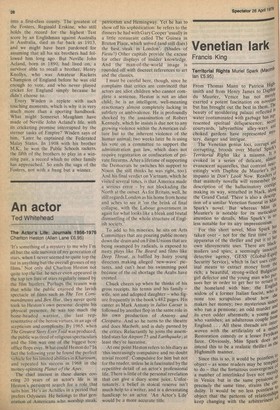An actor
Ted Whitehead
The Actor's Life: Journals 1956-1976 Charlton Heston (Allen Lane £6.95) 'It's something of a mystery to me why I'm all but the sole survivor of my generation of stars, when I never seemed to quite top the list in anything but the overall grosses of my films.' Not only did Charlton Heston not quite top the list, he never even appeared in the top ten lists of stars regularly issued by the film hustlers. Perhaps the reason was that while the public enjoyed the lavish spectacle of films such as The Ten Commandments and Ben Hur, they never quite took to Heston's own persona: despite his physical presence. he was too much the bone-headed warrior, the last representative of the heroic virtues, in an age of scepticism and complexity. By 1965. when The Greatest Story Ever Told was produced, the public was tired of religious spectaculars and the film was one of the biggest boxoffice flops ever. What could Heston do? In fact the following year he found the perfect vehicle for his limited abilities in Khartoum, and repeated his success in 1968 in the money-spinning Planet of the Apes.
The chief interest in these diaries covering 20 years of an actor's life is in Heston's persistent search for a role that suits him. He's an Achilles in a period that prefers Odysseus. He belongs to that generation of Americans who worship steak, patriotism and Hemingway. Yet he has to show off his sophistication: he refers to the dinners he had with Gary Cooper 'usually in a little restaurant called The Guinea in Bruton Place, which served (and still does) the best steak in London'. (Shades of Fiesta!) Other capitals provide the excuse for other displays of insider knowledge. And the man-of-the-world image is rounded off with discreet references to art and the classics.
I must be careful here, though. since he complains that critics are convinced that actors are idiot children who cannot complete a sentence. Heston is not an idiot child; he is an intelligent, well-meaning reactionary almost completely lacking in subtlety or ambivalence. He is profoundly shocked by the assassination of Robert Kennedy, which he insists is due not to any growing violence within the American culture but to the inherent violence of the human animal; two weeks later he is using his vote on a committee to support the administration gun law, which does not require registration or confiscation of private firearms. After a lifetime of supporting the Democrats he switches his support to Nixon (he still thinks he was right, too). And his final verdict on Vietnam. which he visited several times, is that America made a serious error by not blockading the North at the outset. As for Britain, well, he still regards London as his home from home and aches to see it 'on the brink of final collapse, with the Labour government in again for what looks like a bleak and brutal dismantling of the whole structure of English society.'
To add to his miseries, he sits on Arts Committees that are pouring public money down the drain and on Film Unions that are being swamped by radicals, is exposed to nasty plays like The Beard and films like Deep Throat, is baffled by hairy young directors making alleged 'new-wave' pictures, and can't heat his swimming pool because of the oil shortage the Arabs have created.
Chuck cheers up when he thinks of his gross receipts. his tennis and his family wife, son and adopted daughter who figure frequently in the book's 482 pages. His career as Mark Antony in Julius Caesar is followed by another flop in the same role in his own production of Antony and Cleopatra. And so he turns to the theatre and does Macbeth. and is duly panned by the critics. Reluctantly he joins the assembled stars for Airport 75 and Earthquake; at least they're lucrative.
At one point Heston refers to his diary as 'this increasingly compulsive and no doubt trivial record'. Compulsive for him but not for the reader, unless he is fascinated by the repetitive detail of an actor's professional life. There is little of the personal revelation that can give a diary some juice. Unfortunately. a belief in stoical reserve isn't much help to a writer, and is a devastating handicap to an actor. 'An Actor's Life' would be a more accurate title.






































 Previous page
Previous page